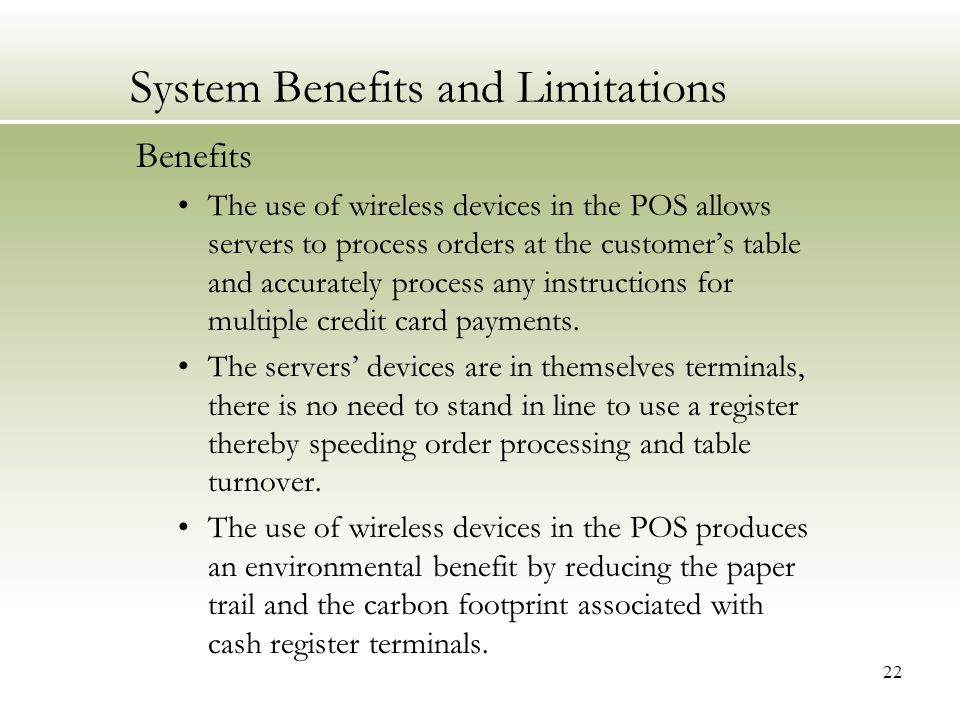Scope and Limitation of POS Systems: Empowering Businesses
In today’s fast-paced world, Point of Sale (POS) systems have become an integral part of the business landscape. These systems offer efficiency, accuracy, and convenience, revolutionizing the way businesses manage transactions and inventory. However, like any technology, POS systems come with their own set of limitations. In this article, we will delve into the scope and limitations of POS systems, shedding light on their significance in modern commerce.
Introduction to POS Systems
POS systems are the heart of modern retail and hospitality businesses. They are the central hub where transactions, sales, and customer interactions converge. These systems comprise hardware and software components that facilitate efficient and secure payment processing, inventory tracking, and customer management.
The Scope of POS Systems

Expanding Sales Opportunities
One of the primary advantages of POS systems is their ability to expand sales opportunities. With features like mobile payments and online ordering integration, businesses can cater to a broader customer base. This technology ensures that no sale is missed, whether it’s in-store, online, or via a mobile app.
Enhancing Customer Experience
POS systems contribute significantly to enhancing the customer experience. They allow for faster checkout times, personalized promotions, and seamless loyalty programs. By analyzing customer data, businesses can tailor their offerings to individual preferences, thereby increasing customer satisfaction and loyalty.
Streamlining Inventory Management
Efficient inventory management is a game-changer for businesses. POS systems keep real-time track of product availability, reorder points, and sales trends. This data helps businesses optimize stock levels, reduce overstocking or understocking, and minimize losses due to expired products.
Data-Driven Insights
POS systems generate a wealth of data that can be harnessed for strategic decision-making. Businesses can analyze sales patterns, peak hours, and product performance to make informed choices. These insights drive marketing campaigns, pricing strategies, and inventory management.
Limitations of POS Systems
Initial Setup Costs
While the long-term benefits are significant, the initial setup costs of a POS system can be prohibitive for small businesses. Purchasing hardware, software licenses, and training staff can strain a limited budget.
Ongoing Maintenance
POS systems require regular maintenance to ensure they operate smoothly. Software updates, hardware repairs, and troubleshooting can be time-consuming and costly. Downtime during maintenance can disrupt business operations.
Vulnerability to Technical Glitches
No technology is immune to technical glitches. POS systems can experience software bugs, hardware malfunctions, or connectivity issues. These glitches can result in transaction delays and frustrate customers.
Limited Offline Functionality
POS systems heavily rely on an internet connection. In areas with poor connectivity, offline transactions become a challenge. Businesses must have contingency plans in place to handle such situations.
Security Concerns
The handling of sensitive customer data in POS systems makes them attractive targets for cyberattacks. Businesses must invest in robust security measures to protect customer information and financial data.
Scalability Challenges
As businesses grow, their POS requirements may evolve. Adapting an existing system to accommodate more locations, products, or features can be complex and costly.
Adapting to the Modern Business Landscape
To maximize the benefits of POS systems while mitigating their limitations, businesses should adopt a proactive approach. Regularly updating hardware and software, investing in cybersecurity, and providing staff training are essential steps. Additionally, evaluating the scalability of the chosen POS system can help businesses remain agile as they expand.
Conclusion
In conclusion, POS systems play a pivotal role in modern commerce. Their scope encompasses expanding sales opportunities, enhancing customer experience, streamlining inventory management, and providing data-driven insights. However, businesses must also navigate the limitations, including setup costs, ongoing maintenance, technical glitches, limited offline functionality, security concerns, and scalability challenges. By addressing these challenges effectively, businesses can harness the full potential of POS systems and empower their growth.

Frequently Asked Questions (FAQs)
- Are POS systems only suitable for retail businesses?
- No, POS systems can benefit various industries, including restaurants, hospitality, and service-oriented businesses.
- How can businesses ensure data security with POS systems?
- Implementing encryption, regular software updates, and training staff in data security best practices are crucial steps.
- What is the average lifespan of a POS system?
- The lifespan can vary but is typically around 5 to 7 years, depending on maintenance and technology advancements.
- Can POS systems be used offline?
- Some POS systems offer limited offline functionality, but a stable internet connection is generally recommended for seamless operation.
- How can businesses scale their POS systems as they grow?
- Businesses can explore scalable POS solutions or work with providers that offer flexibility in adding features and locations.
Enhancing Business Operations: The Role of POS Systems
In the world of modern commerce, staying ahead of the competition requires a deep understanding of your operational tools. The platform piece, often overlooked, refers to the technical or systemic limitations present in any business system or operation. As professionals in the field of Accounts Payable (AP), it’s crucial to master the intricacies of every system or operation within your store. In this article, we’ll delve into the world of POS (Point of Sale) systems, uncovering their capabilities, limitations, and how they can shape the success of your business.

Understanding the POS System
POS System: Revolutionizing Retail
The Point of Sale (POS) system has emerged as a game-changer, replacing traditional cash registers in a variety of businesses, including retail stores, restaurants, and lodges. It combines inventory management with sales processing, streamlining operations for greater efficiency and accuracy.
Scope and Limitation of POS Systems
Scope: What Can It Do?
The proposed automated Point of Sale system offers a wide scope of capabilities. It automates inventory tracking, making it a perpetual inventory counting method that operates electronically. This real-time inventory management is invaluable for businesses of all sizes.
Limitations: What to Keep in Mind
While the POS system offers tremendous benefits, it’s essential to understand its limitations. One critical limitation is its offline operation. Unlike some systems, the POS system requires an offline connection to function optimally. This limitation can impact businesses that rely on continuous online operations.
Integration and Compatibility
POS Systems: Beyond Platform Limitations
POS systems are renowned for their independence from platform and operating system restrictions. Unlike many other software solutions, they adapt seamlessly to various environments, making them highly versatile and compatible.
Scoping the Future: Intelligent POS Systems
The Future of POS Grocery Systems
Looking ahead, the scope of POS systems is set to expand further, especially with the integration of intelligent features. These smart systems promise more efficient and data-driven operations, providing businesses with a competitive edge in the market.
Overcoming Limitations
Adapting to Budget and Hardware Constraints
It’s essential to recognize that limitations can often be overcome or mitigated. Factors like budget constraints or hardware limitations can be addressed with careful planning and strategic choices. Businesses can find solutions that align with their specific needs.
Security and Data Protection
Strengthening Security Measures
To enhance security, consider overlaying POS transaction data onto the system. This additional layer of protection adds an extra level of security, safeguarding your business against potential threats.
Embracing Innovation
Online Integration: A Seamless Experience
Embracing online ordering integrated with your POS system can provide a seamless experience for both customers and staff. This modern approach ensures that orders are processed efficiently and accurately, enhancing customer satisfaction.
Conclusion
In conclusion, the POS system has revolutionized the way businesses operate, offering a wide scope of capabilities while acknowledging certain limitations. As AP professionals, mastering the nuances of this technology can significantly impact your business’s success. By understanding its strengths and weaknesses, you can make informed decisions, adapt to changing circumstances, and propel your business to new heights. Keep an eye on the evolving landscape of POS systems, as intelligent solutions promise even more significant benefits in the future.